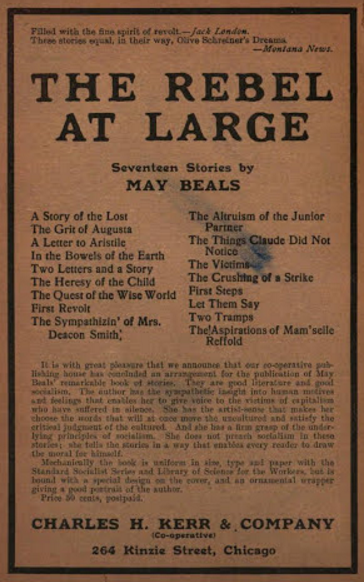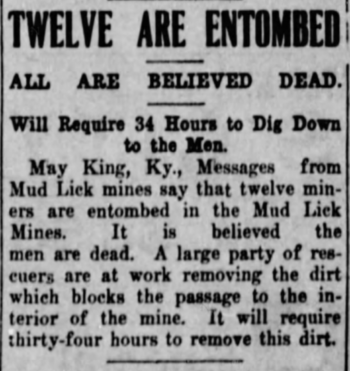Dagos are cheaper than props.
-C. F. & I. Mine Manager
Hellraisers Journal, Tuesday September 4, 1906
From the International Socialist Review: “The Rebel at Large”

The September issue of the Review offers the following recommendation of the recently published volume of Socialist short-stories by May Beals:
SOCIALIST FICTION.
The volume of stories by May Beals, entitled, “The Rebel at Large,” already announced in these pages, is now ready. These are charming stories, which will at first sight interest readers who know nothing of socialism, while their effect will inevitably be to create a decided interest in the subject on the part of any who are not hopelessly committed to the party of the ruling class. Mechanically, the volume is in the same shape as the Standard Socialist Series, or the Library of Science for the Workers, but is bound in the same cloth used in the International Library of Social Science, and has a new and distinctive cover design.
The same design is used in the second edition of “God’s Children” by James Allman, which has just been published. This “Modern Allegory” is one of the most vigorous arguments against capitalism ever written and the continued demand has made a new edition necessary. Both of these volumes retail at 50c, with the usual terms to stockholders.
In the September 2nd edition of the Tulsa Daily World, we find news of yet another tragic mine disaster:

This sad news brings to mind one of the stories from Rebel at Large by May Beals:
The Victims
—–“It is not coal you are burning up,
But human creatures’ lives.”The flaring, flickering light from the lamps in their caps showed their coal-begrimed faces as they huddled together and talked in hushed tones of the thing that had happened. Near them on the floor of the mine lay a man’s head, blackened and blood-smeared. A little beyond it was a hand, the fingers still twitching slightly. From underneath the mass of slate, newly fallen, a little red stream trickled slowly toward them. They moved a little farther from it, and a little farther, until they were huddled against the opposite wall, but it followed them stealthily.
They knew that they must die. No human power could rescue them before the deadly gases crept upon them. But the horror in their eyes was not all a horror of death.
The youngest, a boy of fourteen, slipped his hand into his father’s.
“Let’s write to her,” he said, “and to the children.”
“Write,” groaned the father, “write! What can we tell her? Can we tell her how to fill six mouths when she has nothing—nothing?”
“We can tell her,” the boy said bravely, though the horror deepened in his eyes, “that we’re not afraid to die.”
The man was already fumbling in his pocket for a pencil. The others followed his example.
“I’m not afraid to die,” the father said, “but God knows I’m afraid for her to live.”
They crouched down in the narrow space and began writing on such scraps of paper as they could find in their pockets, spreading it out as smoothly as possible on knee or dinner pail or smooth bit of slate. For a long while there was unbroken silence, save for the labored breathing of the men as the air became more oppressive and the scratching of the pencils as their work-stiffened fingers moved clumsily, but rapidly, in the race with death. And, though they knew that it was their master’s greed for profits that had made the mine a death trap, there was no word of bitterness or resentment in the letters they wrote to their dearest.
Before they had finished writing one of them fell back and lay writhing and gasping for breath. They did not try to revive him. They knew that to do so would only prolong his torture. When he lay still at last, with distorted face and protruding tongue, they felt a little relieved. They knew he was at rest.
The boy was trembling violently. Each breath was harder to draw than the one before it. He turned a little with his back to the dead man, and looked at his father.
“I’ll tell her to use my clothes for the children,” he whispered. “She won’t do it unless I tell her to—and it will help a little.”
* * * * * * *
And outside, in the clear, morning sunlight, the women were weeping.
But in one of the costliest mansions of a city not far away a man sat at his dainty breakfast table scowling over the news that had just reached him through the telephone.
He looked across at the prettily painted thing for whom he had divorced the wife of his youth.
“It will cost a confounded lot of money,” he growled, “to get that mine in working order again.”
SOURCES
The International Socialist Review Volume 7
-ed by Algie Martin Simons, Charles H. Kerr
Charles H. Kerr & Company
July 1906-June 1907
https://books.google.com/books?id=t7kWAAAAYAAJ
ISR of Sept 1906
https://books.google.com/books/reader?id=t7kWAAAAYAAJ&printsec=frontcover&output=reader&source=gbs_atb&pg=GBS.PA129
Review of Rebel at Large by May Beals
https://books.google.com/books/reader?id=t7kWAAAAYAAJ&printsec=frontcover&output=reader&source=gbs_atb&pg=GBS.PA128
Tulsa Daily World
Tulsa, Indian Territory
-Sept 2, 1906
https://www.newspapers.com/image/77740004/
The Rebel at Large
-by May Beals
Charles H. Kerr, 1906
https://books.google.com/books?id=MX5YAAAAMAAJ&dq=Rebel+at+large+may+beals&source=gbs_navlinks_s
The Victims
https://books.google.com/books/reader?id=MX5YAAAAMAAJ&printsec=frontcover&output=reader&source=gbs_atb&pg=GBS.PA82
IMAGES
Rebel at Large, May Beals, ISR Aug 1, 1906
https://books.google.com/books/reader?id=t7kWAAAAYAAJ&printsec=frontcover&output=reader&source=gbs_atb&pg=GBS.PA66
Twelve Miners Entombed in KY, Tulsa Dly, Sept 2, 1906
https://www.newspapers.com/image/77740004/
See also:
Mother Jones on “dagos” and props
https://books.google.com/books/reader?id=Gj46AQAAMAAJ&printsec=frontcover&output=reader&source=gbs_atb&pg=GBS.PA2630
Tag: May Beals
http://caucus99percent.com/tags/may-beals
Mud Lick Mine Disaster of 1906
Chicago Daily News Almanac and Year Book, Volume 23
Chicago Daily News, Incorporated, 1906
https://books.google.com/books?id=NXJQAQAAMAAJ
Events of 1906-Mining Disasters
https://books.google.com/books/reader?id=NXJQAQAAMAAJ&printsec=frontcover&output=reader&source=gbs_atb&pg=GBS.PA276
Note: Sadly the press coverage that I have available ends without describing the outcome of the rescue efforts at Mud Lick, Kentucky. However, it does appear that all twelve men did indeed perish due to the cave-in. I have been unable to find a list of their names-more research needed.
~~~~~~~~~~~~~~~~~~~~~~~~~~~~~~~~~~~~~~~~~~~~~
Angels Love Coal Mines – by Craig Bancoff
